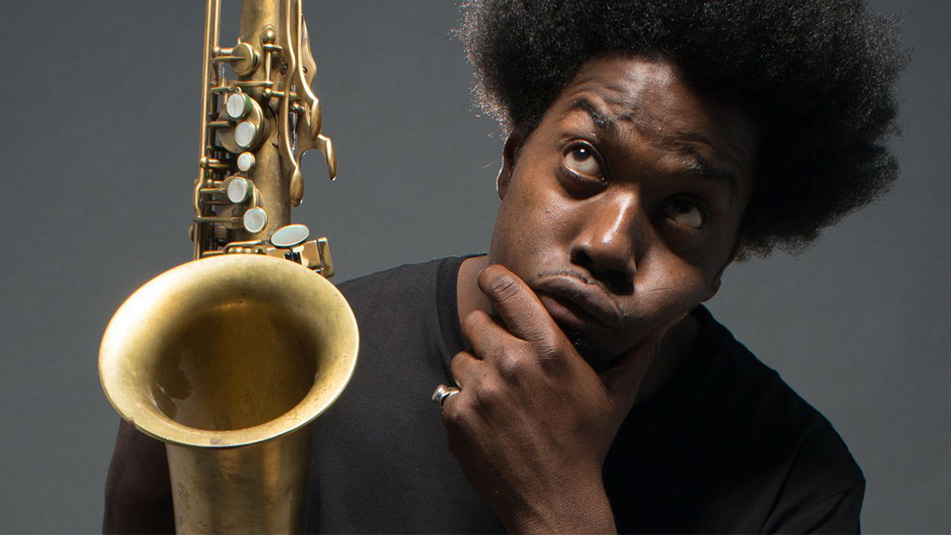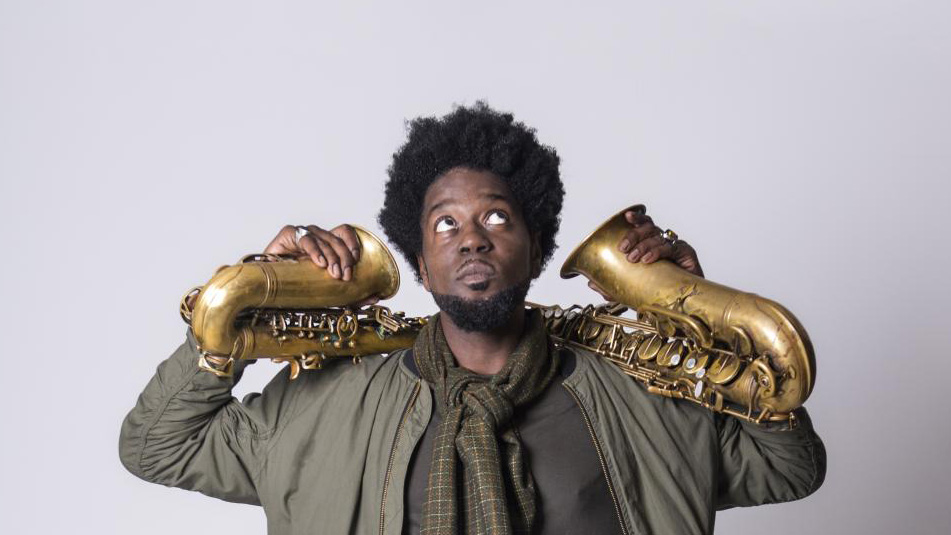Jazz Meets Hip Hop:
Soweto Kinch's Singular Path
June 8, 2018 | by Richard Scheinin

Soweto Kinch
A leading voice in the British jazz explosion, saxophonist Soweto Kinch talks with journalist Richard Scheinin ahead of his SFJAZZ debut on June 16, part of the 36th Annual San Francisco Jazz Festival.
—— —— ——
Soweto Kinch has “never wanted that shiny smooth saxophone sound,” he says. No, the London-born saxophonist and rapper always has gone after a sound that has some grain and grit -- that has some weight to it. It’s the kind of saxophone approach he discovered in hip-hop samples when he was 13 years old, a kid equally smitten with John Coltrane and Public Enemy, with Gary Bartz and A Tribe Called Quest. The son of a playwright father and an actress mother, he is an inquisitive soul – wide-open, finding inspiration in the spoken word, theater and dance. All have made their way into his musical projects: “The Legend of Mike Smith,” one of his albums, was inspired by Dante’s “The Divine Comedy” and tells the story of a rapper possessed by the seven deadly sins. Seamlessly aligned with hip-hop and jazz, Kinch is a progenitor and leader of the current British jazz explosion – a mentor to younger stars including Shabaka Hutchings. At age 40, Kinch keeps pressing ahead, blowing off labels. Genre restrictions seemingly mean nothing to him.
Jazz and hip-hop share a common root, in that you can trace the ancestry of African diasporic music and improvisation in both.
“There are so many things I want to emote and so many things I want to say,” he explains. “There’s just too much music to be made – and I haven’t the time to worry about what it conforms to, or to worry about which audience is displeased or disgruntled by what I’m doing. You have to make music where you’re led by your own conviction, and that’s increasingly what I aim to do.”
When Kinch debuts at SFJAZZ (June 16, two shows in the Joe Henderson Lab), he will lead a trio featuring bassist Nick Jurd and drummer Nazir Ebo. An 18-year-old newcomer, Ebo was only 11 – and already “prodigiously swinging” -- when Kinch first heard him play at a workshop in Philadelphia. (Ebo is the younger brother of Justin Faulkner, the drummer in Branford Marsalis’s quartet.) Abetted by Kinch’s live looping, the trio will focus on tunes from Nonagram, the saxophonist’s most recent album, which was inspired by a long period of research -- “geeking out,” he jokes -- into ancient mathematical systems. Its title derives from the “nonagon,” a nine-sided geometric figure of much import to Kinch, who says the number “9” undergirds the mathematical universe, but is often overlooked. It is “ubiquitous and invisible,” he says, “much like poor people, like black people.” The album’s tunes wind their way through unusual metric patterns, without making a show of their complexities. Kinch aims for “elasticity and a sense of liberation” in his performances. As brainy as his music can be – thick with ideas – it stays grounded in groove, melody, heart. For Kinch, art, in its essence, is connected to the street.
I think where [Wynton]’s had the wrong end of the stick for decades now is by conflating the sort of commercial end of gangster rap that the mainstream music industry puts out there with the intensely creative underground scene.

He grew up in the English city of Birmingham’s Handsworth neighborhood, which has spawned such talents as Stevie Winwood and Steel Pulse. Defined by waves of immigration – Afro-Caribbean, Irish, Punjabi, and, more recently, Eastern European – the neighborhood is still Kinch’s home. He bicycles around town and runs into people he knew in church years ago, or shop keepers who’ve been around for longer than he can remember. The neighborhood offers a “sense of solidarity and community,” he says, chugging on a bottle of water after a cycling excursion through the city’s center. (We conducted our interview via FaceTime.) He describes the left-wing and Afro-centric circles in which he was raised: “Both of my parents, I think, would describe themselves as pan-African in their outlook. That really framed my approach and identity. I never let it go, even when I went off to Oxford,” where he majored in modern history. “That’s where my inheritance lies.”
Actors, poets, visual artists and musicians were frequent guests at Kinch’s house when he was growing up. He started on the saxophone at age nine – that number again – and got serious when he was 13, in 1991. That year, his father organized Birmingham’s first international festival for black theater, an event that incited Kinch’s creative imagination. Also that year, he went to the Edinburgh Festival with his dad, who was touring with one of his plays. Two jazz musicians – singer/percussionist Frank Holder and tap dancer Will Gaines – were in the cast, and it was around this time that Kinch “caught the jazz bug.” Gaines gave him a carton of tapes, including Coltrane’s “Giant Steps” and Sonny Rollins’s “Saxophone Colossus,” which accelerated the 13-year-old’s obsession. Later that year, he saw Wynton Marsalis in concert at Birmingham Symphony Hall and snuck backstage to meet the trumpeter, who encouraged Kinch: “My direction was set in stone,” he says.
Before long, he came under the wing of some of the UK’s luminary saxophonists: Jean Toussaint, Courtney Pine, Jason Yarde. He went on the road with bassist Gary Crosby, a Blakey-esque incubator of British jazz talents. All the while, he maintained his connections to hip-hop: "Jazz and hip-hop share a common root,” he has said, “in that you can trace the ancestry of African diasporic music and improvisation in both.” Tactfully, he distances himself from Marsalis’s strident critiques of the hip-hop scene: “I think where he’s had the wrong end of the stick for decades now is by conflating the sort of commercial end of gangster rap that the mainstream music industry puts out there with the intensely creative underground scene -- the musicality that exists in hip-hop culture. That’s something that has not been understood by the musical mainstream.”
Kinch drives home his rhetorical points through his recordings.
His 2003 debut album, Conversations with the Unseen, includes tracks where the confluence of scatted vocals and freestyle seems beyond natural; at its best, it’s something like Bird and Diz meeting Pharcyde. “A Life in the Day of B19: Tales of the Tower Block,” from 2006, weaves the stories of three inner-city Birmingham men through the saxophonist’s raw fusion of hip-hop and jazz. (B19 is the zip code of one of Birmingham’s most impoverished neighborhoods.) On 2013’s The Legend of Mike Smith – which Kinch has adapted for the stage – he again sets his saxophone alongside his own rapping as MC Mike Smith confronts his sloth, his lust, his greed. “When will I be getting mine?” is a repeated refrain. The album is intense: “The frenetic pace at which I chose to rap on that record – it puts me in mind of the modern age,” Kinch says. “Everyone’s always looking at the other person, comparing, wanting to do that little bit more. No one’s ever happy.” The central character’s journey becomes a kind of descent into madness, a psychosis that Kinch relates to modern consumerism.
With each record, his music has grown more ambitious, more layered -- almost orchestral at times, though it simultaneously feels raw, unvarnished, in the pocket. The grit and the weight of his sound – the qualities he’s been after since he was 13 – are in evidence.
He once told a story about Branford Marsalis who “advised me I would reach a `crossroads’ and have to choose between these conflicting approaches” of playing both hip-hop and jazz. “I haven’t had to yet.”
A staff writer at SFJAZZ, Richard Scheinin is a lifelong journalist. He was the San Jose Mercury News' classical music and jazz critic for more than a decade and has profiled scores of public figures, from Ike Turner to Tony La Russa and the Dalai Lama.
